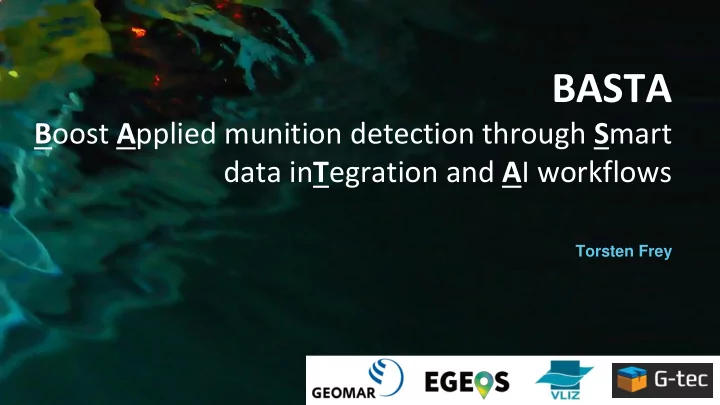

BASTA B oost A pplied munition detection through S mart data in T egration and A I workflows Torsten Frey
BASTA Consortium Partner Tasks Related Projects GEOMAR Helmholtz Centre for Coordination, AUV modification, UDEMM, Ocean Research Kiel, Germany fieldwork, munition detection ROBEMM, JPIO using AI, stakeholder involvement Vlaams Instituut Voor De Zee VZW, Technical development SBP, DISARM, JPIO, Belgium advanced data processing, MERCW fieldwork EGEOS, GmbH, Germany Multi-sensor data base, AI DAIMON, North application, quality matrix Sea Wrecks, development AmuCAD G-tec SA, Belgium Sensor integration, fieldwork, data MERCW support
Munition in the Seas, a Problem for over 70 Years Large amounts of munitions have been dumped into the seas after WWI and WWII. In Belgium, mostly chemical munition from WWI causes threats, while in Germany, mainly deployed/dumped munition during/after WWII are relevant.
Munition in the Seas, a Problem for over 70 Years Large amounts of munitions have been dumped into the seas after WWI and WWII. In Belgium, mostly chemical munition from WWI causes threats, while in Germany, mainly deployed/dumped munition during/after WWII are relevant. 1.6 million tons in German waters alone
BASTA Objectives • Advance data acquisition through: • ultra-high-resolution 3D sub-bottom profiling • intelligent AUV-based magnetic mapping • adaptive and iterative survey approach • Foster sustainable use of survey and WW I/II archived data • within a multi-sensor database • with advanced data processing of Big Data • with artificial intelligence for detecting/identifying munition with uncertainty levels • Discuss new tools, methods and workflows with stakeholders to formalize recommendations and quality definitions for industry actors and authorities
BASTA Activities Advancing data acquisition • Sensor integration in AUV (magnetic sensors) • Advancement of ultra-high 3D mapping through smart processing • Test of workflows in three munition areas of the Baltic and North Sea during research cruises (first cruise schedules in May 2020 RV BELGICA, applied for the second cruise in November 2020 RV ALKOR) Historic data and multi-sensor database • Include historic data in hot-spot definition • Data format check • Digest project and stakeholder data in database (-> AmuCAD)
BASTA Activities Quality assurance of data sets • Definition of quality indicators & validation with real data • Definition of quality standards for upcoming surveys • Evaluation of quality levels of existing data sets (task dependent) AI-supported munition detection • Test different methods (ML, OBIA, …) and ML algorithms (RF, CNN, SVM, … ) and implement as tools in the database using bathymetry, magnetic, sub-bottom information • HPC/GPU-supported for derivative calculation
BASTA Activities Stakeholder involvement • Discussion with associated partners about their requirements and challenges • Supply of data for AI training • Verification of BASTA workflow-usability by industry and governments Kick off 14. January 2020 in Berlin Tools: BASTA welcomes additional Data sharing of public and disclosed data associated partners Open workshops Project meetings with associated partners Contact: basta@geomar.de Associated Partners: TenneT, DEME, Vattenfall, WWF, BSH, Schleswig-Holstein Ministry – MELUND, NKT, EOD-SH
BASTA Results for Economy and Environment • Evaluation of European waters with respect to its munition contamination to enable the full economic potential of these areas for Europe’s Blue -Growth • Quality guideline for detection of munition in the sea as a reliable and accountable standard for UXO companies and contractors • Providing additional methods and technologies for a reliable quantitative assessment of munition contamination in the marine environment • Establishment of an operational and scalable database tailored for munition in the sea understanding, evaluation and risk assessment
BASTA Specific Relevance for Policy and Legislation BASTA is relevant for aspects of integrated EU maritime policy: • Maritime spatial planning (MSP) and integrated coastal management (ICZM) • Support the coordination of polices relevant for marine and coastal areas, such as: • Environmental policies: MSFD, WFD, Natura Habitat Directives • Other policies: Renewable Energy Directive, Common Fisheries Policy (CFP) • Enable identification of effective future use of maritime and coastal areas • Provide input to Strategic Environmental Assessments (Directive 2001/42/EC) • Blue Growth Strategy: Aquaculture, coastal tourism, ocean energy and seabed mining • Integrated maritime surveillance: BASTA can provide input data to the common information sharing environment (CISE) BASTA will furthermore: • Increase monitoring capabilities of OSPAR (JAMP) and HELCOM (HELCOM Monitoring and Assessment Strategy) members
Recommend
More recommend